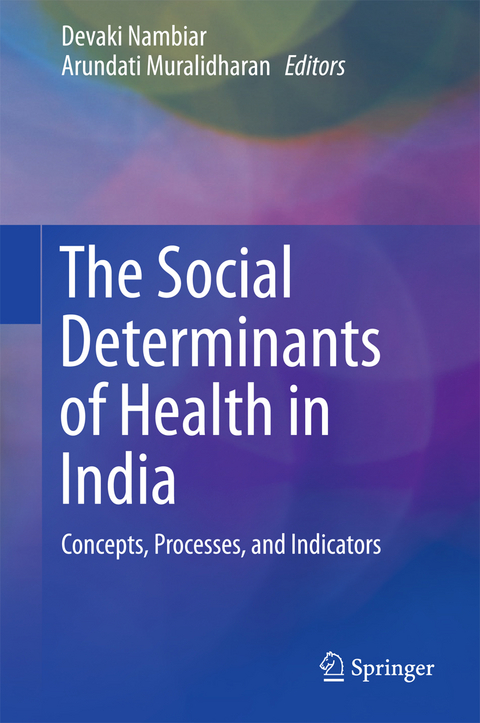
The Social Determinants of Health in India
Springer Verlag, Singapore
978-981-10-5998-8 (ISBN)
Devaki Nambiar is a Senior Research Scientist at the Public Health Foundation of India (PHFI) who employs social science theory and mixed methods to understand and address health inequalities and social exclusion in health systems of resource-poor settings. She concurrently supports post-graduate training and capacity building in health policy and systems research as an Associate Professor at the Indian Institute of Public Health – Delhi. She is also a Bernard Lown Scholar at the Harvard School of Public Health working with community health workers on improving access to primary health care services related to non-communicable diseases. She has a doctorate in Public Health (PhD) from the Johns Hopkins Bloomberg School of Public Health. Arundati Muralidharan is Manager Policy for WASH in Health and Nutrition, Schools at WaterAid India. From 2012-2016, she was a Senior Research Fellow at PHFI. As a public health practitioner and qualitative researcher, Arundati isinterested in addressing the factors that underlie and influence health and health behaviour, with the aim to identify and promote effective, evidence-based strategies. Her focus is on water, sanitation, and hygiene (WASH) and gender. She has a Masters in Medical and Psychiatric Social Work from the Tata Institute of Social Sciences in Mumbai and a Doctorate in Public Health (DrPH) from Boston University.
1. Palimpsests of ‘Social Determinants of Health’ – From Historical Conceptions to Contemporary Practice in Global and Indian Public Health Devaki Nambiar. Part I CONCEPTUALISATION. -2. Bringing the ‘Social’ Back in: Social Determinants of Health as a Methodological Lens Arima Mishra. -3. Conflict as a Social Determinant of Health: Explorations from Manipur Veda Yumnam & Rajib Dasgupta. -4. Deconstructing the Urban Transition: Conceptualisation, Measurement and Mechanisms Nandita Bhan. -5. Missing the Forest for the Trees – the significance of the distal Social Determinants of Health in India Indira Chakravarthi. Part II OPERATIONALISATION. -6. Shram Jeevani: Special Task Force Report on Women Labour in Informal Economy in Bihar Sushmita Goswami. -7. Who’s in Charge of Social Determinants of Health? Understanding the Office of the Municipal Health Officer in Urban Areas .- 8. Scaling up a community-based approach to Social Determinants of Health: Reflections on the SEWA experience Sapna Desai. Part III OVERSIGHT. -9. Promoting Inter-sectoral Action on Menstrual Health and Hygiene Management: Arriving at a Framework and Indicators to Inform Policy and Programmes Arundati Muralidharan. -10. Chhattisgarh Swasth Panchayat Yojana: Convergent Decision Making for Health and its Determinants in Rural India Samir Garg. -11. Community Monitoring and Action in Maharashtra is Making Child Nutrition Services Accountable and Effective Shweta Marathe & Abhay Shukla. -12. Social Determinants of Maternal Health: Dead Women Talking Renu Khanna & Subhashri B. -13. Weaving it together: Concepts, methods and indicators Devaki Nambiar and Arundati Muralidharan. Annexures: Indicator Registry.
| Erscheinungsdatum | 31.10.2017 |
|---|---|
| Zusatzinfo | 7 Illustrations, color; 2 Illustrations, black and white; XXVII, 226 p. 9 illus., 7 illus. in color. |
| Verlagsort | Singapore |
| Sprache | englisch |
| Maße | 155 x 235 mm |
| Themenwelt | Medizin / Pharmazie ► Gesundheitswesen |
| Studium ► 1. Studienabschnitt (Vorklinik) ► Med. Psychologie / Soziologie | |
| Studium ► Querschnittsbereiche ► Prävention / Gesundheitsförderung | |
| Wirtschaft | |
| Schlagworte | Alma Ata declaration • child nutrition services • community based health services • conflict as a social determinant of health • draft National Health Policy • health equity • health in rural India • institutional structures for public health • maternal mortality in India • menstrual health and hygiene management • universal access to healthcare • universal health coverage • urban health in India |
| ISBN-10 | 981-10-5998-5 / 9811059985 |
| ISBN-13 | 978-981-10-5998-8 / 9789811059988 |
| Zustand | Neuware |
| Informationen gemäß Produktsicherheitsverordnung (GPSR) | |
| Haben Sie eine Frage zum Produkt? |
aus dem Bereich


